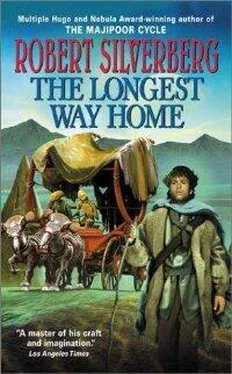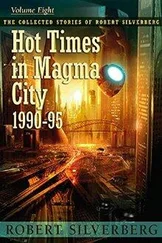The Longest Way Home
by Robert Silverberg
All fixed, fast-frozen relations, with their train of ancient and venerable prejudices and opinions, are swept away… All that is solid melts into air, all that is holy is profaned, and man is at last compelled to face with sober senses his real conditions of life, and his relations with his kind.
For Mark and Janet
The first explosions seemed very far away: a string of distant, muffled bangs, booms, and thuds that might have been nothing more than thunder on the horizon. Joseph, more asleep than not in his comfortable bed in the guest quarters of Getfen House, stirred, drifted a little way up toward wakefulness, cocked half an ear, listened a moment without really listening. Yes, he thought: thunder. His only concern was that thunder might betoken rain, and rain would spoil tomorrow’s hunt. But this was supposed to be the middle of the dry season up here in High Manza, was it not? So how could it rain tomorrow?
It was not going to rain, and therefore Joseph knew that what he thought he had heard could not be the sound of thunder—could not, in fact, be anything at all. It is just a dream, he told himself. Tomorrow will be bright and beautiful, and I will ride out into the game preserve with my cousins of High Manza and we will have a glorious time.
He slipped easily back to sleep. An active fifteen-year-old boy is able to dissolve into slumber without effort at the end of day.
But then came more sounds, sharper ones, insistent hard-edged pops and cracks, demanding and getting his attention. He sat up, blinking, rubbing his eyes with his knuckles. Through the darkness beyond his window came a bright flash of light that did not in any way have the sharpness or linearity of lightning. It was more like a blossom unfolding, creamy yellow at the center, purplish at the edges. Joseph was still blinking at it in surprise when the next burst of sound erupted, this one in several phases, a low rolling roar followed by a sudden emphatic boom followed by a long, dying rumble, a slow subsiding. He went to the window, crouching by the sill and peering out.
Tongues of red flame were rising across the way, over by Getfen House’s main wing. Flickering shadows climbing the great gray stone wall of the faзade told him that the building must be ablaze. That was incredible, that Getfen House could be on fire. He saw figures running to and fro, cutting across the smooth, serene expanse of the central lawn with utter disregard for the delicacy of the close-cropped turf. He heard shouting and the sound, unmistakable and undeniable now, of gunfire. He saw other fires blazing toward the perimeter of the estate, four, five, maybe six of them. A new one flared up as he watched. The outbuildings over on the western side seemed to be on fire, and the rows of haystacks toward the east, and perhaps the field-hand quarters near the road that led to the river.
It was a bewildering, incomprehensible scene. Getfen House was under attack, evidently. But by whom, and why?
He watched, fascinated, as though this were some chapter out of his history books come to life, a reenactment of the Conquest, perhaps, or even some scene from the turbulent, half-mythical past of the Mother World itself, where for thousands of years, so it was said, clashing empires had made the ancient streets of that distant planet run crimson with blood.
The study of history was oddly congenial to Joseph. There was a kind of poetry in it for him. He had always loved those flamboyant tales of far-off strife, the carefully preserved legends of the fabled kings and kingdoms of Old Earth. But they were just tales to him, gaudy legends, ingenious dramatic fictions. He did not seriously think that men like Agamemnon and Julius Caesar and Alexander the Great and Genghis Khan had ever existed. No doubt life on Old Earth in primitive times had been a harsh, bloody affair, though probably not quite as bloody as the myths that had survived from that remote era suggested; but everyone was quite sure that the qualities that had made such bloodshed possible had long since been bred out of the human race. Now, though, Joseph found himself peering out his window at actual warfare. He could not take his eyes away. It had not yet occurred to him that he might be in actual danger himself.
All was chaos down below. No moons were in the sky this night; the only illumination came from the flickering fires along the rim of the garden and up the side of the main wing of the house. Joseph struggled to make out patterns in the movements he saw. Bands of men were running up and down the garden paths, yelling, gesticulating furiously to each other. They appeared to be carrying weapons: rifles, mainly, but some of them just pitchforks or scythes. Now and again one of the riflemen would pause, drop to one knee, aim, fire into the darkness.
Some of the animals seemed to be loose now, too. Half a dozen of the big racing-bandars from the stable, long-limbed and elegantly slender, were capering wildly about, right in the center of the lawn, prancing and bucking as though driven mad by panic. Through their midst moved shorter, slower, bulkier shapes, stolid shadowy forms that most likely were the herd of dairy ganuilles, freed of their confinement. They were grazing placidly, unconcerned by the erupting madness all about them, on the rare shrubs and flowers of the garden. The house-dogs, too, were out and yelping: Joseph saw one leap high toward the throat of one of the running men, who without breaking stride swept it away with a fierce stroke of his scythe.
Joseph, staring, continued to wonder what was happening here, and could not arrive at even the hint of an answer.
One Great House would not attack another. That was a given. The Masters of Homeworld were bound, all of them, by an unbreakable webwork of kinship. Never in the long centuries since the Conquest had any Master struck a blow against another, not for anger’s sake, not for greed’s.
Nor was it possible that the Indigenes, weary after thousands of years of the occupation of their world by settlers from Old Earth, had decided finally to take back their planet. They were innately unwarlike, were the Indigenes: trees would sing and frogs would write dictionaries sooner than the Indigenes would begin raising their hands in violence.
Joseph rejected just as swiftly the likelihood that some unknown band of spacefarers had landed in the night to seize the world from its present masters, even as Joseph’s own race had seized it from the Folk so long ago. Such things might have happened two or three thousand years before, but the worlds of the Imperium were too tightly bound by sacred treaties now, and the movements of any sort of hostile force through the interstellar spaces would quickly be detected and halted.
His orderly mind could offer only one final hypothesis: that this was an uprising at long last of the Folk against the Masters of House Getfen. That was the least unlikely theory of the four, not at all impossible, merely improbable. This was a prosperous estate. What grievances could exist here? In any case the relationship of Folk to Masters everywhere was a settled thing; it benefited both groups; why would anyone want to destabilize a system that worked so well for everyone?
That he could not say. But flames were licking the side of Getfen House tonight, and barns were burning, and livestock was being set free, and angry men were running to and fro, shooting at people. The sounds of conflict did not cease: the sharp report of gunfire, the dull booming of explosive weapons, the sudden ragged screams of victims whose identity he did not know.
He began to dress. Very likely the lives of his kinsmen here in Getfen House were in peril, and it was his duty to go to their aid. Even if this were indeed a rebellion of the Folk against the Getfens, he did not think that he himself would be at any risk. He was no Getfen, really, except by the most tenuous lines of blood. He belonged to House Keilloran. He was only a guest here, a visitor from Helikis, the southern continent, ten thousand miles away. Joseph did not even look much like a Getfen. He was taller and more slender than Getfen boys of his age, duskier of skin, as southerners tended to be, dark-eyed where Getfen eyes were bright blue, dark-haired where Getfens were golden. No one would attack him. There was no reason why they should.
Читать дальше












